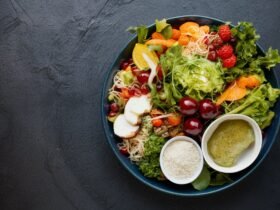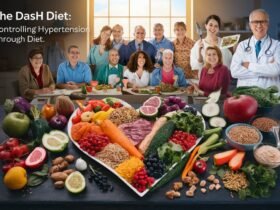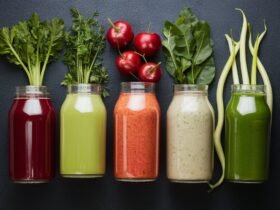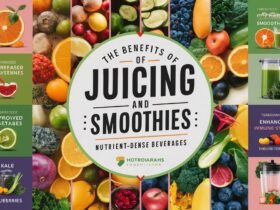Nutrition for Healthy Aging: Supporting Longevity and Vitality
Hey there, my young and curious friends of 2024! It’s your favorite nutrition guide, Nita Sharda, here to take you on a fascinating journey into the world of healthy aging. Now, I know what you might be thinking – “Aging? But I’m only 10 years old! Why should I care about that?” Well, let me tell you a little secret – the habits you build now, at your young age, can have a big impact on how healthy and happy you are as you grow older.
Think of it like this – imagine you have a brand new toy car. If you take really good care of it, keep it clean, and make sure it has all the right parts, it will run smoothly and last a long time. But if you neglect it, let it get dirty and rusty, and don’t give it the proper maintenance, it will break down much faster. Your body is kind of like that toy car – the better you take care of it now, the better it will serve you as you age.
So, are you ready to become a healthy aging superhero? Let’s dive in and learn all about how nutrition can help you live a long, vibrant, and adventurous life!
What is Healthy Aging?
First things first, let’s talk about what we mean by “healthy aging.” Healthy aging isn’t just about living a long time (although that’s certainly part of it!). It’s about maintaining your physical, mental, and emotional well-being as you get older, so you can continue to do all the things you love and enjoy a high quality of life.
Some key aspects of healthy aging include:
- Staying physically active and maintaining mobility
- Keeping your brain sharp and engaged
- Maintaining strong social connections and a sense of purpose
- Preventing or managing chronic diseases like heart disease, diabetes, and cancer
- Enjoying a balanced and nutritious diet
That last one is what we’re going to focus on today – how the foods you eat can help support healthy aging from the inside out!
The Role of Nutrition in Healthy Aging
So, why is nutrition so important for healthy aging? Well, the foods we eat provide our bodies with the building blocks they need to function properly – things like vitamins, minerals, antioxidants, and other important nutrients. As we age, our bodies may become less efficient at absorbing and using these nutrients, which can lead to deficiencies and health problems over time.
But by focusing on a balanced and nutritious diet, we can help ensure that our bodies have all the tools they need to stay strong, healthy, and resilient as we age. In fact, research has shown that certain dietary patterns, like the Mediterranean diet (which we’ll talk more about later), can help reduce the risk of chronic diseases, improve brain function, and even increase lifespan!
So, let’s take a closer look at some of the key nutrients and dietary strategies that can help support healthy aging.
Key Nutrients for Healthy Aging
1. Protein: Building and Maintaining Muscle Mass
As we age, our bodies naturally start to lose muscle mass and strength – a process called sarcopenia. This can make it harder to do everyday activities, increase the risk of falls and fractures, and even impact our metabolism and immune function.
But by getting enough protein in our diets, we can help slow down this muscle loss and maintain our strength and mobility as we age. Good sources of protein include lean meats, fish, eggs, dairy products, beans, lentils, and tofu. Aim to include a source of protein at every meal and snack to help keep your muscles strong and healthy.
2. Omega-3 Fatty Acids: Boosting Brain Health
Omega-3 fatty acids are a type of healthy fat that’s been shown to have powerful anti-inflammatory and brain-boosting effects. These fats, which are found in fatty fish like salmon, sardines, and mackerel, as well as in plant sources like flaxseeds, chia seeds, and walnuts, can help improve memory and cognitive function, reduce the risk of age-related cognitive decline and dementia, and even improve mood and mental well-being.
Aim to include sources of omega-3s in your diet at least twice a week, or consider taking a supplement if you don’t eat fish regularly.
3. Calcium and Vitamin D: Keeping Bones Strong
As we age, our bones can become more fragile and prone to fractures – a condition called osteoporosis. But by getting enough calcium and vitamin D in our diets, we can help keep our bones strong and healthy throughout our lives.
Good sources of calcium include dairy products like milk, yogurt, and cheese, as well as leafy green vegetables, tofu, and calcium-fortified foods like orange juice and plant-based milks. Vitamin D, which helps our bodies absorb and use calcium, can be found in fatty fish, egg yolks, and fortified foods, as well as through exposure to sunlight.
Aim to include calcium-rich foods in your diet every day, and talk to your doctor about whether you may need a vitamin D supplement, especially if you don’t get much sun exposure.
4. Antioxidants: Fighting Inflammation and Oxidative Stress
Antioxidants are powerful compounds found in many plant foods that help protect our cells from damage caused by inflammation and oxidative stress. These processes are thought to contribute to many age-related diseases, including heart disease, cancer, and Alzheimer’s disease.
By including plenty of antioxidant-rich foods in our diets, we can help reduce inflammation and oxidative stress, and support healthy aging from the inside out. Some of the best sources of antioxidants include colorful fruits and vegetables like berries, leafy greens, sweet potatoes, and bell peppers, as well as nuts, seeds, whole grains, and green tea.

Aim to eat a rainbow of colorful plant foods every day to get a wide variety of antioxidants and other important nutrients.
The Mediterranean Diet: A Blueprint for Healthy Aging
One dietary pattern that has been extensively studied for its potential benefits for healthy aging is the Mediterranean diet. This way of eating, which is based on the traditional diets of people living in countries bordering the Mediterranean Sea, emphasizes:
- Plenty of fruits, vegetables, whole grains, legumes, nuts, and seeds
- Moderate amounts of fish, poultry, eggs, and dairy products
- Limited amounts of red meat, processed foods, and added sugars
- Olive oil as the primary source of fat
- Moderate consumption of red wine (for adults)
Research has shown that following a Mediterranean-style diet can help reduce the risk of chronic diseases like heart disease, diabetes, and certain cancers, as well as improve brain function and mental well-being. It’s also been associated with increased lifespan and a reduced risk of age-related cognitive decline and dementia.
So, how can you start incorporating more Mediterranean-style foods into your diet? Here are a few tips:
- Make fruits and vegetables the star of your meals, aiming for at least half your plate to be filled with colorful produce at every meal
- Choose whole grains like brown rice, quinoa, and whole wheat bread instead of refined grains like white rice and white bread
- Include a variety of plant-based proteins like beans, lentils, nuts, and seeds in your meals and snacks
- Enjoy fish and seafood at least twice a week, choosing fatty fish like salmon, sardines, and mackerel when possible
- Use olive oil as your primary cooking oil, and enjoy it drizzled over salads and vegetables
- Limit your intake of red meat, processed foods, and added sugars, saving them for special occasions or treating them as “sometimes” foods
Healthy Aging is a Lifelong Journey
Remember, my young friends, healthy aging is a lifelong journey – it’s not something that happens overnight or that you can achieve with a quick fix or fad diet. By focusing on a balanced and nutritious diet, staying physically active, and taking care of your mental and emotional well-being, you’re setting yourself up for a long, healthy, and fulfilling life.
And the best part? It’s never too early (or too late!) to start building these healthy habits. By learning about nutrition and healthy aging now, at your young age, you’re giving yourself a powerful tool to help you navigate the ups and downs of life with resilience, vitality, and joy.
So go forth and nourish your body, mind, and spirit with all the good stuff – colorful fruits and veggies, whole grains, lean proteins, healthy fats, and plenty of love and laughter. Your future self will thank you!
And remember, if you ever have questions or need support on your healthy aging journey, don’t hesitate to reach out to trusted adults like your parents, teachers, or healthcare providers. We’re all in this together, and we’re here to cheer you on every step of the way.
Happy, healthy aging, my friends – the adventure of a lifetime awaits!













Leave a Reply